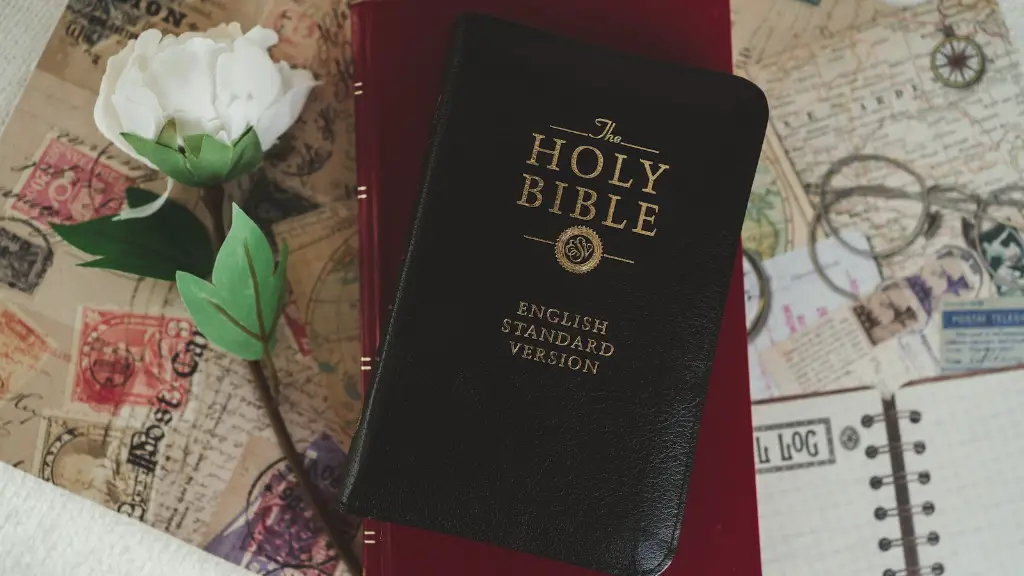Ishmael was the son of Abraham and Sarah’s handmaiden Hagar, and he is a significant figure in the Hebrew Bible, Christianity, and Islam. He is typically characterized as a wanderer, an exile and a sojourner. Ishmael is considered one of the forefathers of the semitic people. In Christianity, Ishmael is not an ancestor of Jesus, but in Islam, Ishmael is revered as a prophet of Allah and a forefather of the prophet Muhammad.
The story of Ishmael begins in Genesis, when Abraham and Sarah’s attempts to bear a child had failed. Sarah then proposes they use her handmaiden Hagar, and a son is born to Hagar and Abraham. Sarah, who had been barren, is not pleased with the situation and Hagar and Ishmael are driven away by Sarah. Ishmael then grows up in the wilderness, where God takes pity on him and makes him fruitful.
Ishmael is best known for his role in the events surrounding Abraham’s sacrificing of his son. In later interpretations of the Bible, Jews, Christians and Muslims each give different interpretations of the events in the sacrifice story. Jewish tradition does not traditionally associate Ishmael with the sacrifice, instead claiming that Isaac was the intended victim in the sacrifice. Christian tradition generally claims that it was Isaac, as does Muslim tradition.
Another important role for Ishmael is as a symbol for exile and wandering. Ishmael was cast away from the land of promise, and then wandered in the wilderness without a place to call home. This theme of wandering and being an exile is one that appears in multiple stories involving Ishmael.
Ishmael is also an important figure in Islam, where he is considered a prophet of Allah and a forefather of the prophet Muhammad. Muslims see Ishmael as an ancestor of the prophet Muhammad and his people, and the Islamic tradition has a strong connection to Ishmael’s progeny.
The stories of Ishmael are a significant part of the Biblical, Christian, and Islamic traditions. These stories show how a person, even in difficult and challenging circumstances, can overcome adversity and make a positive contribution to the world. Ishmael also provides an example of the power of faith to enable someone to survive in difficult situations and fulfill an important role in what God has in store for them.
Ishmael’s Legacy
Ishmael’s legacy is a significant one in the three Abrahamic religions. He is the father of twelve sons, the twelve tribes of Ishmael, who became a major presence in the Middle East, including modern-day Saudi Arabia and Yemen. Ishmael is also known as a symbol of exile, and of faith in the face of adversity. His descendants are instructed to live in the wilderness, without a homeland, and remain faithful to God.
In Christianity, Ishmael is considered an important figure for his role in the Abrahamic covenant, and for his role in the events surrounding Abraham’s apparent sacrifice of his son. In Islam, Ishmael is seen as a prophet of Allah and an ancestor of Muhammad. Ishmael is honored by Muslims for his faithfulness and his willingness to perform a difficult task for God. For Jews, Ishmael is not an ancestor of their faith, but he is seen as an important figure in the faith of Islam, and as a symbol of exile and suffering.
The legacy of Ishmael is one of faith and endurance in the face of difficulty. As a symbol of exile and wandering, Ishmael is remembered as a figure of faith and perseverance in the face of adversity. He is a reminder that even in difficult situations, it is possible to remain faithful to God and fulfill the plans God has for us.
Conclusion
Ishmael is a significant figure in the Hebrew Bible, Christianity, and Islam. He is typically portrayed as a wanderer, an exile, and a sojourner. Ishmael is considered an ancestor of the semitic people, and he is revered as a prophet of Allah and a forefather of Muhammad in Islam. Ishmael’s legacy is one of faith, endurance, and perseverance in the face of difficulty, and he is a reminder that even in difficult situations it is possible to remain faithful to God.
The Role of Women
The Bible features a number of female characters, including a significant role for Ishmael’s mother, Hagar. Hagar is an integral part of the story of Ishmael, and her position is seen as a significant one in the story of Abraham, Sarah and Ishmael. Hagar’s willingness to do God’s will is seen as an example of faith and endurance in the face of difficult circumstances. Hagar is also the symbol of loyalty, love and compassion that binds the lives of Ishmael, Abraham and Sarah together.
Hagar’s position as a female is one that is celebrated in the Bible. She was a widow, with no husband to speak for her, yet she was willing to take a role that was not expected of her. Hagar’s faithfulness and her willingness to submit to Abraham’s plans are seen as a positive example of female empowerment in the face of male authority. She shows that even in a patriarchal society, it is possible to be strong in one’s faith and have an impact on the lives of others.
Hagar is also seen as a symbol of protection and comfort, as she takes Ishmael into the wilderness after they are driven away by Sarah. Even in difficult circumstances, Hagar remains a source of strength and comfort for Ishmael. She is a reminder of the power of female love and protection, and her role in Ishmael’s story is an important one.
The Significance in Abrahamic Religions
The story of Ishmael is a significant one in the three Abrahamic religions. Ishmael is seen as a symbol of faith and perseverance, and his willingness to submit to God is seen as an example for later generations. Ishmael is also seen as an example of the power of faith to enable someone to overcome adversity, no matter what the circumstances.
Ishmael is an important figure in Jewish, Christian and Islamic traditions. The story of Ishmael has multiple interpretations, and depending on one’s perspective, one can take away different lessons from Ishmael’s story. In Islamic tradition, Ishmael is regarded as a prophet of Allah and an ancestor of Muhammad. In Jewish and Christian traditions, Ishmael is seen as an important figure in the covenant between Abraham and God, and for his role in the events surrounding Abraham’s apparent sacrifice of his son.
The legacy of Ishmael is an important one in the Abrahamic religions. He is remembered as a symbol of faith and perseverance in the face of adversity, and as an example of the power of faith to enable someone to fulfill an important role in what God has planned for them. Ishmael’s legacy is an important one that has shaped the religious traditions of three major religions.
Contemporary Significance
Ishmael’s contemporary significance is seen in his power as a symbol of faith and perseverance in the face of difficulty and exile. In the modern world, Ishmael serves as an example to those who are suffering and are in need of hope. He is a reminder that even in difficult circumstances, it is possible to remain faithful to God and to fulfill an important role in what God intends for us.
Ishmael is also seen as a symbol of the power of God and the power of faith to change difficult situations for the better. He is a reminder that no matter what difficult circumstances people may face, it is possible to remain faithful to God and find hope and strength in Him. Ishmael’s story is an important one, and his significance in the contemporary world is one that should not be forgotten.
Ishmael is also seen as a symbol of the power of cooperation and unity between different religions. In his story, Ishmael and his descendants are instructed to live in the wilderness, without a homeland, and remain faithful to God. This common theme of wandering and being an exile is seen in multiple stories involving Ishmael, and is seen as a reminder that even in difficult times, unity between different faiths is possible.
Ishmael in Art and Culture
Ishmael is seen as a significant figure in art and culture, and his story has been told and retold in works of literature, art, and music. For example, the story of Ishmael is featured prominently in Herman Melville’s classic novel Moby-Dick. In this novel, Ishmael symbolizes a journeyman looking for a spiritual home, and it is Ishmael who ultimately finds salvation. Ishmael is also a prominent figure in the Epic of Gilgamesh, a classic of Middle Eastern literature. Many of the passages in the Epic of Gilgamesh feature references to Ishmael and his legacy.
Ishmael has also been featured in many prominent works of art and music. Ishmael is seen as a symbol of suffering and displacement, and his story has been used to shed light on modern issues, such as the plight of refugees and displaced peoples. Ishmael has been portrayed in many works of art and is seen as a symbol of faith in the face of adversity and suffering.
Ishmael is a significant figure in the Abrahamic traditions, and his significance can be seen in art, culture, and contemporary society. Ishmael is seen as a symbol of faith and perseverance in the face of difficulty, and his story is an important one that has shaped the lives of many people. Ishmael is a reminder of the power of faith and endurance in the face of adversity, and his legacy is an important one that should not be forgotten.





